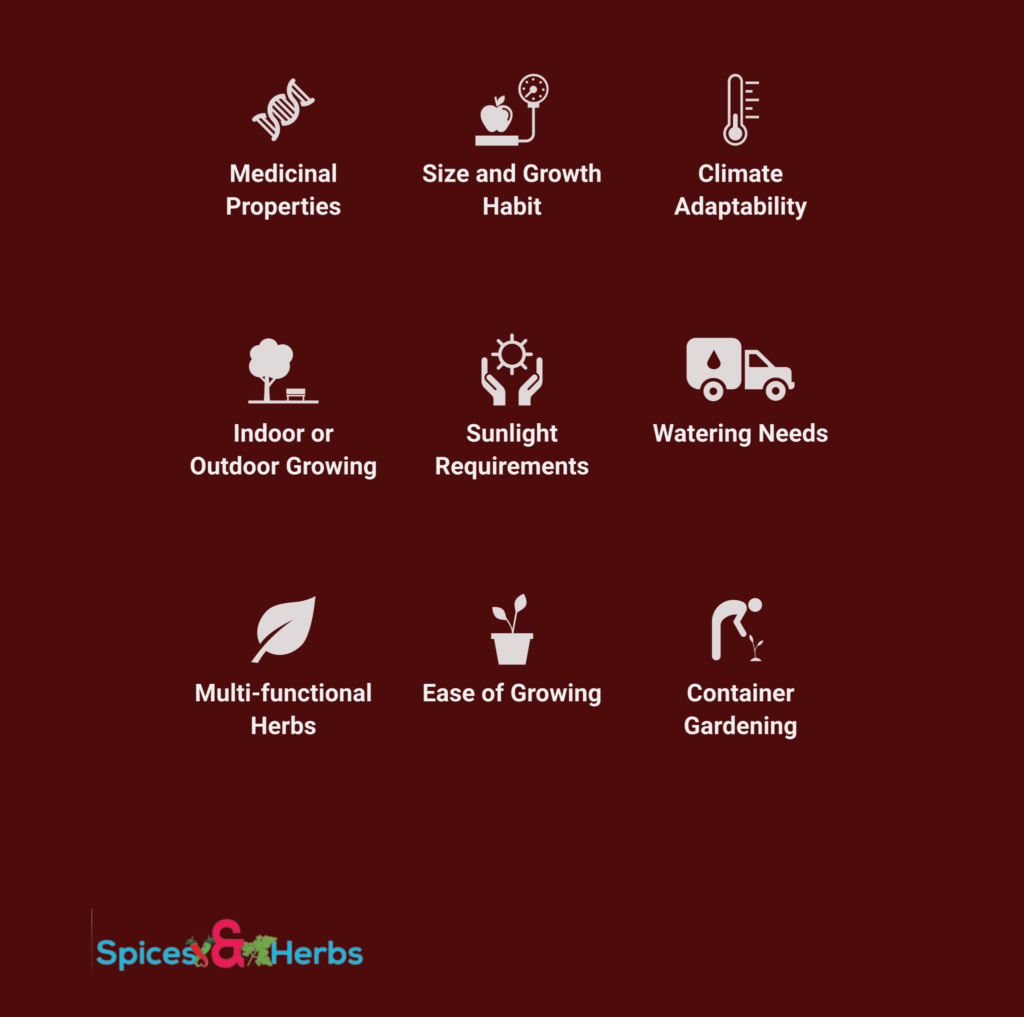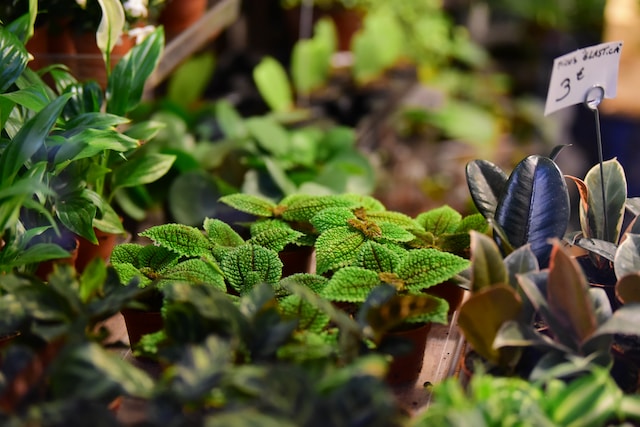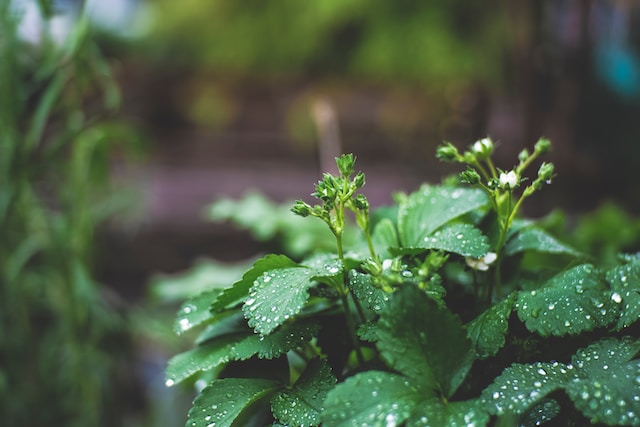In this blog, we’ll show you how to create a thriving herb garden, no matter how limited your area is. Discover the magic of nurturing healing plants right in the comfort of your home. Throughout this journey, we’ll share easy tips and tricks about growing medicinal herbs in a small space. From soothing chamomile to invigorating mint, you’ll learn about various herbs and their amazing benefits.
Understanding seasonal adjustments is key to success, and we’ll guide you on how to adapt to each herb’s changing needs throughout the year. So, let’s roll up our sleeves and dive into the joy of herb gardening in small spaces. Get ready to savor the beauty and healing power of nature’s green gifts!
Choosing the Right Medicinal Herbs to Grow in a Small Space
Choosing the right medicinal herbs to grow in a small space requires careful consideration of the herbs’ growth habits, space requirements, and medicinal properties. Here are some factors to consider when selecting medicinal herbs for a small garden or indoor space:

🟩 Medicinal Properties
Before selecting medicinal herbs for your small garden, identify the specific health benefits you wish to harness from these plants. Some herbs possess calming properties that aid relaxation and stress relief, while others boast immune-boosting effects or are renowned for their anti-inflammatory and antioxidant properties. Understanding the medicinal properties of the herbs will help you target your health needs or interests effectively.
🟩 Size and Growth Habit
Given the limited space available, it’s crucial to choose medicinal herbs that have a compact growth habit or can be easily managed vertically. Opt for herbs that won’t overwhelm your garden with sprawling growth or extensive root systems. Pruning-friendly herbs like thyme, oregano, and rosemary can be kept well-contained, ensuring they won’t dominate your small space.
🟩 Climate Adaptability
The success of your medicinal herb garden largely depends on selecting herbs that are well-suited to the climate in your region. Some herbs are more sensitive to extreme temperatures or require specific growing conditions. By choosing herbs that naturally thrive in your area’s climate, you can ensure they grow robustly and remain healthy throughout the seasons.
🟩 Indoor or Outdoor Growing
Assess whether you prefer to grow your medicinal herbs indoors or outdoors based on the available space and lighting conditions. Some herbs, like basil and parsley, can flourish indoors on a sunny windowsill, while others, such as lavender or echinacea, might perform best when grown outdoors, basking in natural sunlight and fresh air.
🟩 Sunlight Requirements
Light is a fundamental factor in plant growth, and different herbs have varying sunlight requirements. Most herbs prefer full sun exposure to flourish, while others can tolerate partial shade. Understanding the sunlight needs of your chosen herbs will enable you to allocate the best locations in your small garden to provide the ideal growing conditions.
🟩 Watering Needs
Each herb has its specific water requirements, and it’s essential to select herbs that share similar watering needs. This practice ensures efficient management of your watering schedule and prevents overwatering or underwatering, both of which could compromise the health of your medicinal plants.
🟩 Multi-functional Herbs
Consider the versatility of the herbs you choose to grow. Some herbs, like lemon balm, offer a range of benefits beyond their medicinal properties. For instance, lemon balm can be used not only for its calming effects but also as a delightful culinary herb in various dishes and beverages.
🟩 Ease of Growing
If you’re relatively new to gardening or have limited time for maintenance, opt for medicinal herbs that are easy to grow and require minimal attention. Hardy and forgiving herbs like mint and chives are excellent choices for beginners, as they generally adapt well to different growing conditions.
🟩 Container Gardening
Given the small space available, prioritize herbs that thrive in containers and won’t outgrow their boundaries. Container gardening allows you to make the most of your limited area, making it easier to manage and organize your medicinal herb garden effectively.
By carefully considering these factors, you can create a well-planned and purposeful medicinal herb garden in your small space, providing both a beautiful display and a bountiful supply of health-enhancing herbs.
Preparing the Environment Before Growing Medicinal Herbs in a Small Space

Growing medicinal herbs in a small space can be a rewarding and beneficial endeavor. To ensure successful growth and optimize the health and productivity of the herbs, it’s essential to prepare the environment properly. Here are some steps to consider before growing medicinal herbs in a small space:
🟦 Find the Perfect Spot
The key to successful herb gardening is finding the right location. Look for a spot that receives ample sunlight, ideally 6-8 hours of direct sunlight per day. Sunlight is crucial for the growth and development of medicinal herbs as it helps in the production of essential oils and other beneficial compounds. If you have limited access to natural light, don’t worry! You can still grow herbs in a small space by using artificial grow lights to supplement the sunlight. These lights provide the right spectrum of light required for healthy plant growth and ensure that your herbs thrive even in indoor environments.
🟦 Measure Your Space
In a small space, planning is essential to make the most of the available area. Before you start planting, take some time to measure your space and assess how much room you have for your herb garden. Consider using vertical gardening techniques, wall-mounted shelves, or hanging pots to maximize space utilization and grow more herbs vertically. This not only saves floor space but also adds a touch of beauty to your surroundings. Additionally, vertical gardening allows you to organize your herbs efficiently, making it easier to care for and harvest them.
🟦 Pick the Right Herbs
Choosing the right medicinal herbs is critical for successful growth in a limited space. Research and select herbs that are well-suited for your climate and available space. Some popular medicinal herbs that thrive in small spaces include mint, basil, chamomile, lavender, thyme, and rosemary. These herbs are not only easy to grow but also have numerous medicinal properties. Consider your intended use for the herbs and select the ones that will best serve your needs. For example, if you’re looking for herbs to aid relaxation, consider growing chamomile and lavender, while mint and basil are excellent choices for culinary and digestive purposes.
🟦 Prepare the Soil
The foundation of any successful herb garden is the soil. Use high-quality, well-draining soil with good aeration to support the healthy growth of your medicinal herbs. Proper soil preparation ensures that the herbs receive essential nutrients and that excess water drains away effectively, preventing issues like root rot. For container gardening, it’s best to use a potting mix instead of garden soil alone. A suitable potting mix can be prepared by combining garden soil, compost, and a mix of perlite or vermiculite. This mix provides good drainage while retaining enough moisture for the herbs to thrive.
🟦 Start with Healthy Seedlings
Whether you choose to start from seeds or purchase seedlings, always opt for healthy plants. If you’re starting from seeds, sow them indoors in containers with a seed-starting mix. Maintain the right temperature, moisture, and light conditions to ensure successful germination. Once the seedlings have grown strong enough and developed a few true leaves, you can transplant them outdoors into their permanent containers or garden beds. Starting with healthy seedlings gives your herbs a head start and increases their chances of survival and success.
🟦 Keep Things Draining Smoothly
Proper drainage is essential for the health of your herbs. Make sure that your containers have adequate drainage holes to prevent waterlogged soil, which can suffocate the roots and lead to root rot. Elevate the containers slightly by placing them on pot feet or bricks to allow excess water to flow freely from the pots. Additionally, avoid using saucers under the containers to prevent water from accumulating at the base.
🟦 Watering Made Right
Watering your herbs appropriately is crucial for their well-being. Different herbs have varying water requirements, so it’s essential to understand their preferences. Generally, herbs prefer slightly moist soil but not waterlogged conditions. To determine when to water, check the top inch of the soil with your finger. If it feels dry, it’s time to water. Always water at the base of the plant to prevent wetting the foliage, as this reduces the risk of fungal diseases. During hot and dry weather, you may need to water more frequently, while in cooler and rainy conditions, you can reduce the frequency of watering.
🟦 Give ‘Em a Nutrient Boost
Like all plants, medicinal herbs need nutrients to grow and thrive. To keep your herbs healthy and productive, use organic fertilizers or compost. Organic options are preferred as they promote long-term soil health and reduce the risk of chemical buildup. Follow the recommended dosage on the fertilizer packaging and avoid over-fertilization, as excessive nutrients can harm the plants and cause nutrient imbalances. During the growing season, you can also provide an occasional dose of compost tea, a nutrient-rich liquid fertilizer made from compost steeped in water.
🟦 Be on Pest Patrol
Regularly inspect your herbs for signs of pests and diseases. In a small space, pests can quickly spread from one plant to another, so early detection is crucial. Keep an eye out for common garden pests like aphids, mealybugs, and spider mites. If you spot any pests, act promptly to address the issue. Employ natural pest control methods like neem oil, and insecticidal soap, or introduce beneficial insects like ladybugs and lacewings to combat pests without resorting to harmful chemicals. Consistent monitoring and preventive measures will help keep your herbs healthy and pest-free.
🟦 Prune and Harvest with Care
Proper pruning and harvesting practices are essential for the health and productivity of your herbs. Regularly prune your herbs to encourage bushier growth and prevent them from becoming leggy. Pruning also promotes better airflow around the plants, reducing the risk of diseases. When it’s time to harvest, do it with care to preserve the plant’s health and medicinal properties. Harvest herbs in the morning when their essential oils are most concentrated.
Use clean, sharp scissors or pruning shears to make clean cuts, and avoid tearing the plant’s stems. After harvesting, you can use fresh herbs immediately or dry them for later use. Properly dried herbs can be stored in airtight containers and used in various medicinal preparations, teas, or culinary dishes.
By following these tips, you can create a thriving medicinal herb garden in your small space, providing you with a delightful array of fresh, beneficial herbs for various medicinal and culinary purposes.
Seasonal Adjustments for Successful Cultivation of Medicinal Herbs in a Small Space

Adjusting the environment of medicinal plants based on the season is crucial for their successful cultivation. Here are some season-specific adjustments you can make for medicinal plants:
🟪 Spring Adjustment
Prepare the Soil: As spring begins, take the time to assess the condition of your soil. Ensure it is well-draining and rich in nutrients to support the upcoming growth of medicinal herbs. Adding organic matter like compost or well-rotted manure can be beneficial in providing essential nutrients to the plants.
Start Seeds Indoors: Take advantage of the milder temperatures in early spring by starting your medicinal herb seeds indoors. Plant the seeds in pots or trays filled with a good-quality potting mix, and place them in a sunny spot with proper ventilation. Transplant the young seedlings outside once the weather becomes consistently warm, and all risk of frost has passed.
Frost Protection: Keep an eye on the weather forecast in early spring, as late frosts can be detrimental to young and tender medicinal plants. Be prepared to protect your plants by covering them with cloths, old bedsheets, or plastic sheets at night when frost is expected.
🟪 Summer Adjustment
Watering: With the arrival of hotter temperatures, the water requirements of medicinal herbs increase. Ensure that your plants receive adequate water, especially if you are growing them in containers. Water deeply at the base of the plants early in the morning or late in the evening to minimize water loss from evaporation and prevent foliage from getting wet, which can lead to disease.
Provide Shade: Some medicinal herbs can be sensitive to intense heat and may require protection from the scorching sun during peak afternoon hours. You can provide shade using umbrellas, and garden fabrics, or by situating the pots in a location that receives partial shade during the hottest part of the day.
Pruning and Harvesting: Throughout the summer, actively prune your herbs to encourage bushier growth and to prevent them from becoming too leggy. Frequent harvesting of leaves and flowers not only promotes continual production but also ensures that the plants direct their energy toward producing more medicinal compounds. This practice also prevents the herbs from going to seed too quickly, extending their productive period.
🟪 Autumn/Fall Adjustment
Harvesting: As autumn approaches, plan to harvest your medicinal herbs before the first frost sets in. This timing allows you to capture the maximum medicinal potency of the plants before they enter their dormant phase. To harvest, use sharp, clean scissors or pruning shears to avoid damaging the plant.
Cover Crops: For those intending to keep certain herbs outdoors during the winter, consider planting cover crops such as clover or winter rye in the fall. These cover crops help protect the soil from erosion, suppress weed growth, and add organic matter when tilled into the soil the following spring.
🟪 Winter Adjustment
Indoor Gardening: As winter arrives, take care of perennial medicinal herbs that cannot withstand freezing temperatures outdoors by bringing them inside. Find a sunny windowsill or use artificial grow lights to provide the necessary light for their growth.
Reduce Watering: During the dormant winter season, plants generally require less water. Allow the soil to dry out slightly between waterings to prevent overwatering, which can lead to root rot.
Control Humidity: Indoor heating systems can create dry air, which may be harmful to some herbs accustomed to higher humidity levels. Consider using a humidifier to maintain an adequate level of moisture around the plants or place a shallow tray filled with water and pebbles near them.
By thoughtfully applying these seasonal adjustments, you can create an ideal environment for cultivating medicinal herbs in a small space. Remember that each herb has its unique preferences, so attentive observation and care will contribute to a successful and rewarding herb garden.
Final Words
As we conclude our journey of growing medicinal herbs in small spaces, we hope you feel inspired and eager to create your own little herb haven. Remember, you don’t need a vast garden to enjoy the magic of herbalism. With just a few pots or containers, you can nurture an abundance of healing plants right where you are.
By following the simple tips and seasonal adjustments we’ve shared, you’ll witness your herb garden thrive throughout the seasons. The beauty and benefits of these plants will fill your space with tranquility and natural remedies. From planting seeds to harvesting leaves and flowers, each step in this herbal adventure is a rewarding experience. As you care for your green healers, they will reward you with their potent properties and delightful scents.
So, don’t hesitate to start your own herb garden and savor the joy of watching it flourish. Let the magic of medicinal herbs infuse your small space with wellness and vitality. Happy gardening, and may your journey with these healing plants be filled with abundance and delight!
To learn more about herb gardening, just click here!
